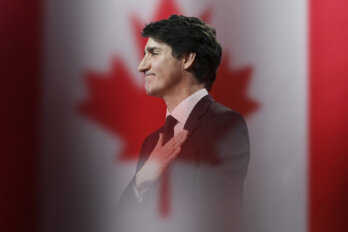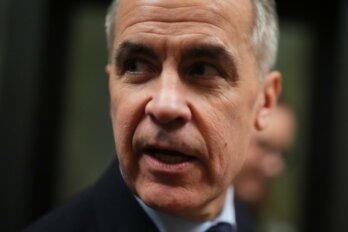I n an unusually combative approach, Shopify executives started to openly reject aspects of the Liberal agenda late last year. Chief Operating Officer Kaz Nejatian, President Harley Finkelstein, and then vice president Daniel Debow all took to X with a barrage of posts criticizing federal spending, regulatory overreach, and what was depicted as Canada’s waning global competitiveness. “Canada’s entrepreneurs,” wrote Nejatian, “deserve better than what they are getting from their government.”
Taken together, the furious tagging, quoting, and reposting captured a frustrated tech class convinced that innovation and ambition were being stifled by bureaucracy. The tone was hostile, sometimes dismissive (“My god. Canada what are we doing,” Finkelstein shot back at then prime minister Justin Trudeau, who had announced new regulations on short-term rentals). But the men weren’t just venting. They called for Canada’s start-up culture to step up, urging entrepreneurs to build a new national vision from the ground up. The mood foreshadowed a post–US election moment that elevated private sector success over government expertise.
South of the border, digital giants were backpedalling on inclusion efforts and cozying up to Donald Trump through substantial contributions to his inauguration fund. Meta adjusted their content moderation policies, signalling an effort to align more closely with the new administration’s preferences. Taylor Owen, founding director of the Centre for Media, Technology and Democracy at McGill University, speculated about the deepening fusion of state and tech power in the US. “While Silicon Valley has always wielded influence in American politics,” he wrote, “what’s emerging now is different—a world where the interests of select technology companies become indistinguishable from US government policy.”
Were the comments from members of Shopify’s executive team evidence of that opportunistic energy spilling over here? The company is a remarkable success story, hosting approximately 4.5 million active stores online across more than 175 countries. Canada’s biggest tech company—and second only to the Royal Bank of Canada in size—the firm is appropriately revered. Some of the leadership’s concerns were tied directly to policy tensions, like the Canada Post strike, which disrupted merchants on their platform by delaying packages. Others arose from abrupt decisions, like the two-month suspension of the GST/HST on essential items, which forced those same businesses to quickly adapt their systems to reflect the change.
Shopify’s outspokenness ended up marshalling other politically engaged tech leaders. Reporting by The Logic revealed that a faction of them created a WhatsApp group called “Build Canada” to start sketching out what a better country might look like. That effort has since graduated to a website boasting “bold ideas.” Among them: using AI to automate government services, making medical histories instantly accessible to health care providers, and streamlining the regulatory process for new transportation technologies.
While the full extent of Build Canada membership hasn’t been officially revealed, Debow is part of the core team, with supporters reportedly including Wealthsimple co-founder and chief executive officer Michael Katchen, and Ivan Zhang, a co-founder of the AI company Cohere—arguably, three of the most influential entrepreneurs in the country. And while it’s not clear how coordinated their efforts are, Shopify co-founder and CEO Tobias Lütke appears to have positioned himself as one of the group’s backers. In theory, sharper scrutiny of public policy should lead to better outcomes. But Lütke, who once vowed to “arm the rebels” against corporate giants like Amazon, has since blamed Canada for Trump’s tariff threats on the country, undermining national unity in the face of an economic threat.
It’s a telling shift. What’s at stake here goes beyond policy influence. The deeper question is whether we’re watching the emergence of a homegrown “broligarchy” treating the country’s future like their next big product launch.
“Broligarchy,” a portmanteau popularized by the Guardian’s Carole Cadwalladr, describes the small, powerful group of male tech leaders courting political power in the US.
These guys—and they’re almost always men—have picked up new side gigs as civil servants, freshly appointed to the Department of Government Efficiency (or “DOGE”) or anointed as the government’s AI and crypto czar. The prominent placement of Elon Musk, Jeff Bezos, and Mark Zuckerberg at Trump’s inauguration prompted Senator Bernie Sanders to warn that the “billionaire class now controls our government”—a sentiment then president Joe Biden echoed in his final address. The Economist noted that this “PayPal mafia” has basically “taken over” the US government, while Slate warned they will “unleash a tech hell.”
While Canada’s baby-brother broligarchy won’t be able to financially back a political candidate to the same degree due to stringent spending limits (not to mention the fact that the Conservatives may not need the cash after setting fundraising records), there are initial signs that the digital elite here have similar ideas about how decisions might be made in the future (unilaterally) and how markets will be governed (they won’t). The tweeters are, at times, anti-regulation—of all kinds, apparently. Domestic firms could also position themselves to be rewarded with massive government subsidies—two of Musk’s companies, for example, account for at least $15.4 billion (US) in American government contracts over the past decade.
To Shopify’s credit, the juggernaut has thrived without and even despite federal policy. During the pandemic, the company teamed up with the government to offer small businesses an extended three-month free trial of their services through the Canada Digital Adoption Program—a customer acquisition play brilliantly disguised as philanthropy. But there was a natural and obvious synergy between their technology and the urgency of bringing small businesses online.
Around that same time, Shopify also briefly gave eligible merchants a free tap and chip card reader. Volunteers at Shopify developed open source code that contributed to the country’s COVID Alert app, and more recently, the company hustled hard to add a feature to its Shop app aimed at helping Canadians buy local, even as its CEO criticized the Liberals’ tariff response (the company also made a “buy local” option for Mexico and the US).
Though Canada’s digital power players haven’t claimed government roles—yet—they’re making their contempt for governance loud and clear on X and earning praise from the leader of the opposition for doing it. While the “bros” in Canada don’t own major social media platforms, like Musk and Zuckerberg do, or newspapers, like Bezos does (though former Shopify executives have acquired BetaKit, a media outlet covering Canada’s start-up scene), their brand of techno-populism may push the sector in a more conservative direction.
Build Canada insists it’s non-partisan, but signs can tell a different story. Some members echo classic arguments against wealth redistribution—like opposing a tax increase on capital gains income, which entrepreneurs argue they need to build successful companies. Members also tend to echo an anti-elite, anti-bureaucratic populism, which argues that government is bloated and should be minimized. Government oversight is characterized as being suffocating and anti-innovation. Techno-populists generally celebrate entrepreneurial self-reliance and hustle culture—which subtly de-emphasizes social safety nets and collective responsibility.
Whether they will fund, back on social media, or even run candidates that are part of the Shopify “mafia” in this federal election still remains to be seen. But the implied logic—that entrepreneurs have a superior grasp of policy and should be at the forefront of government reform—remains. Disruptors indeed.
We have been here before. Recall business magnate Howard Hughes’s lucrative World War II government contracts for the failed Spruce Goose (a massive plane made almost entirely of wood that famously flew only once, for a reported twenty-six seconds), how Robert McNamara transitioned from being the president of Ford Motor Company to the secretary of defence, or that plutocrat Andrew Mellon helmed the treasury secretary over three consecutive Republican administrations.
Now, Musk and others seem poised to follow in their footsteps, albeit at an even greater scale. In some ways, the broligarchy is evocative of the Great Man Theory, which suggests history is shaped largely by extraordinary individuals—again, typically men. A Hacker News commentator recently suggested that, in the attention economy, the leisure class is no longer about luxury or leisure but is defined by net worth and digital clout—status reimagined for the online era.
The new ruling class’s blend of smugness and faith in tech as a cure-all threatens to steer government spending toward the companies they run and bankroll. It’s been alleged, for instance, that Bezos is trying to get rid of the United States Postal Service so that Amazon can run it, while Musk may be trying to get rid of crash reporting on self-driving cars. (Tesla has the highest fatal accident rate of any auto brand.)
So are these US-based billionaires genuinely interested in making the government work more effectively for everyone or just for them? American researcher Matt Stoller has pointed out that cutting government spending is “easy”—if you go after the reliance on external consultants. In Canada, between 2011 and 2023, the Canadian government spent $200 million on professional services from McKinsey & Company. Are we going to simply shift spending on management consultants to tech founders?
DOGE has lots of Canadian fans. According to The Tyee, Ottawa-based life coach Shane Parrish said on X (in a post since deleted) that he wants a similar agency “to exist in Canada,” pledging that he and Finkelstein will help fund those who want to review government initiatives and inviting other potential funders to get in touch with him. The post inspired a giddy avalanche of support. Around the same time, Conservative leader Pierre Poilievre suggested he would “dramatically” cut Canada’s foreign aid budget.
It is lovely for broligarchs to offer to audit government programs on their own dime. But not so lovely that they act like the idea of “Making Government Work Better” is some brilliant revelation they just came up with. Twenty years ago, British Columbia was a pioneer with the Ministry of Small Business and Red Tape Reduction (which slashed over a third of its regulatory requirements in just a few years). Alberta has a minister of service and red tape reduction, and Ontario has a Ministry of Red Tape Reduction.
There’s no question the federal government could use improving. According to a recent Fraser Institute study, Canada’s regulatory burden grew from approximately 66,000 to 72,000 new rules between 2009 and 2018, imposing costs on businesses and reducing productivity. There’s also no question the size and complexity of that bureaucratic thicket can stymie efforts to cut through it. I appreciated Jennifer Pahlka, author of Recoding America: Why Government Is Failing in the Digital Age and How We Can Do Better, asking, “What if even billionaires can’t disrupt the system we have built?”—a sentiment that could just as easily be directed at our government.
This new-found interest in public administration, however, comes with a deep mistrust of the state. The prevailing idea seems to be that tech entrepreneurs and investors must take on the urgent work of reforming government—not as policy makers but as benevolent disruptors. The underlying assumption is that everyone else is incompetent while they alone have the vision to streamline. It’s their apparent indifference to precedent and expertise that feels most dangerous—less a bold new idea than a cowboy-esque power grab. Right now, Musk’s trademark seems chaos, not discipline or order.
Canada is uniquely vulnerable to such a shift at this moment, with the switch in Liberal leadership, a weak dollar, a destabilizing tariff war, and an election. People do not feel as if the government is working well for them. Might tech leaders work any better?
It’s not clear how seriously the bros take their work. Another fitting portmanteau for this moment might be “trolligarchy”—this one coined by The Atlantic’s Megan Garber. In that spirit, the rage-bait X account @CanadaSpends (now expanded into an official website) presents itself as a watchdog for government spending. While its mission is ostensibly about transparency, its online voice and approach echo the slash-and-burn austerity politics of the US. At times, it even feels like an homage to DOGE’s brand of snark: less civic effort, more a pointed ideological performance.
Meanwhile, Build Canada positions itself as a corrective to government inefficiency, implicitly suggesting that the policy development process is needlessly cumbersome and that great ideas are self-evident. By framing itself as a temporary intervention, it avoids the question of why these pop-up thought leaders haven’t engaged in policy making previously through traditional channels. Where were they during pre-budget consultations or parliamentary hearings? It’s hard to ignore the timing: their sudden activism coincided with the proposal to increase the capital gains tax. (Prime Minister Mark Carney has since cancelled it.)
The indeterminate, ethereal nature of the initiative simultaneously projects opportunism and a hyper-simplified view of how policy change actually happens. It subverts the grinding work of reform—offering, instead, a high-profile, CEO-driven shortcut. In doing so, Build Canada delivers an implicit critique: the existing mechanisms for policy evolution just aren’t working. Fair enough, but a subset of the country’s tech founders seems to favour flashy one-off interventions over the slow, iterative work of lasting reform. Policy progress is slow; their patience is thin.
Maybe there isn’t enough evidence of Canada having tech overlords who will seek—beyond gestural posts, AI-informed blogs, and group chats—to dismantle the state. Plus, their theatrics may get people hyped for regulatory modernization, which is no mean feat. Overall, their brazenness is refreshing—execs don’t hide behind the umbrella of a broader lobby group, and companies mostly handle government relations themselves (to wit: Lütke recently registered to lobby Queen’s Park).
Will Canada’s broligarchy be as fleeting as promised, or will it entrench itself by forging new alliances? Another mystery is its true direction. Will these networks spark a meaningful renewal of political discourse in a time of crisis, or will they simply use the language of entrepreneurship to justify shrinking the role of the state?
The American broligarchy has cemented its influence through financial contributions, key appointments, and direct engagement with policy makers. In Canada, it’s less clear how deep influence actually runs. Building Canada’s frustration might be justified, but for now, their alignment with conservative populism is mostly a matter of rhetoric. We may soon discover whether their true aim is to shape policy or to take control of the system itself.





